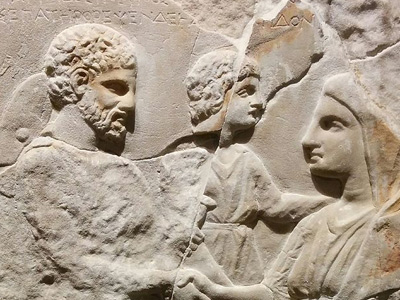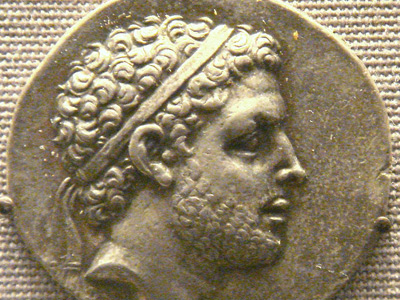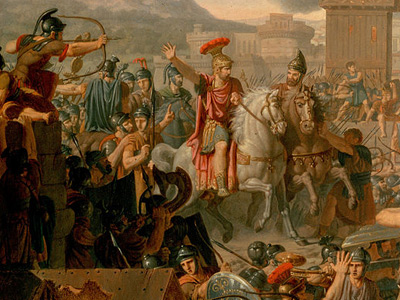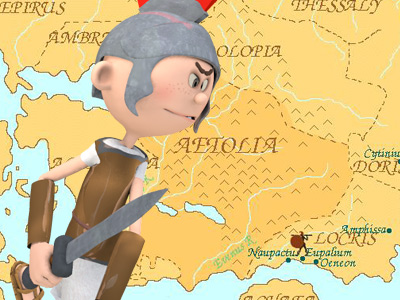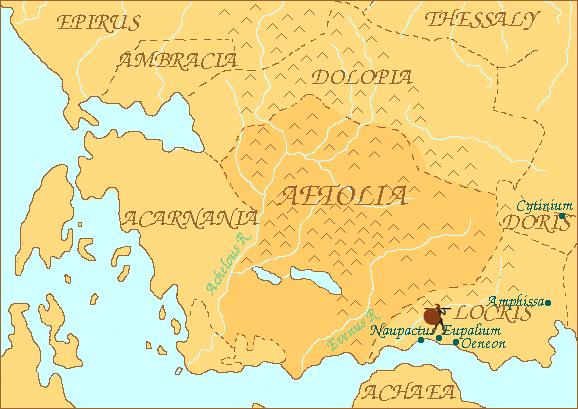First Macedonian War (214–205 BC)
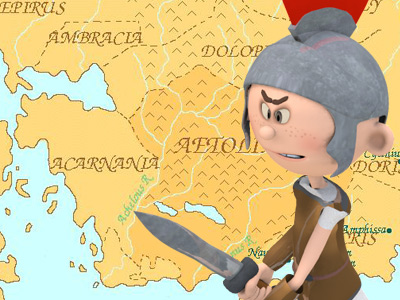
Philip Allies with Carthage
After hearing of Rome's disastrous defeat at the hands of Hannibal at Cannae in 216 BC, Philip sent ambassadors to Hannibal's camp in Italy to negotiate an alliance. There they concluded in the summer of 215 BC a treaty, the text of which is given by Polybius. In it they pledge in general terms, mutual support and defense and to be enemies to each other's enemies (excepting current allies). Specifically they promise support against Rome, and that Hannibal shall have the right to make peace with Rome, but that any peace would include Philip and that Rome would be forced to give up control of Corcyra, Apollonia, Epidamnus, Pharos, Dimale, Parthini, and Atintania and "to restore to Demetrius of Pharos all those of his friends now in the dominion of Rome."
The treaty as set down by Polybius, makes no mention of an invasion of Italy by Philip, the débâcle at Sazan perhaps having soured Philip on such a venture — something which in any case Hannibal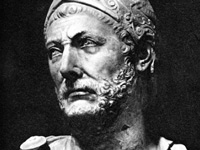 Hannibal Barca (247-183 BC), was a Carthaginian general, considered one of the greatest military commanders in history. Hannibal lived during a period of great tension in the western Mediterranean Basin, when the Roman Republic established its supremacy over other great powers such as ancient Carthage. One of his most famous achievements was at the outbreak of the Second Punic War, when he marched an army which included war elephants from Iberia over the Pyrenees and the Alps into Italy. Hannibal Barca » may not have desired.
Hannibal Barca (247-183 BC), was a Carthaginian general, considered one of the greatest military commanders in history. Hannibal lived during a period of great tension in the western Mediterranean Basin, when the Roman Republic established its supremacy over other great powers such as ancient Carthage. One of his most famous achievements was at the outbreak of the Second Punic War, when he marched an army which included war elephants from Iberia over the Pyrenees and the Alps into Italy. Hannibal Barca » may not have desired.
On their way back to Macedon, Philip's emissaries along with emissaries from Hannibal were captured by Publius Valerius Flaccus, commander of the Roman The Roman Republic was a form of government of Rome and the era of the classical Roman civilization when it was run through public representation of the Roman people. Beginning with the overthrow of the Roman Kingdom (traditionally dated to 509 BC) and ending in 27 BC with the establishment of the Roman Empire, Rome's control rapidly expanded during this period - from the city's immediate surroundings to hegemony over the entire Mediterranean world. fleet patrolling the southern Apulian coast. A letter from Hannibal to Philip, and the terms of their agreement were discovered.
The Roman Republic was a form of government of Rome and the era of the classical Roman civilization when it was run through public representation of the Roman people. Beginning with the overthrow of the Roman Kingdom (traditionally dated to 509 BC) and ending in 27 BC with the establishment of the Roman Empire, Rome's control rapidly expanded during this period - from the city's immediate surroundings to hegemony over the entire Mediterranean world. fleet patrolling the southern Apulian coast. A letter from Hannibal to Philip, and the terms of their agreement were discovered.
Philip's alliance with Carthage caused immediate dismay in Rome, hard-pressed as they already were. An additional twenty-five warships were at once outfitted and sent to join Flaccus' fleet of twenty-five warships already at Tarentum, with orders to guard the Italian Adriatic coast, and to try to determine Philip's intent and if necessary cross over to Macedonia, keeping Philip confined there.
HISTORY
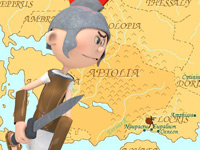
RESOURCES
This article uses material from the Wikipedia article "First Macedonian War (214–205 BC)", which is released under the Creative Commons Attribution-Share-Alike License 3.0.
© Stories Preschool. All Rights Reserved.
